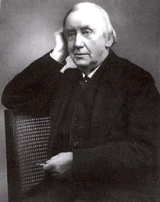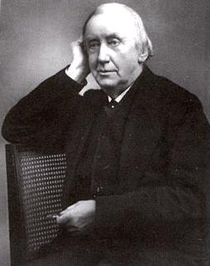
Charles Hallé
Encyclopedia
- This article is about the musician. For his son, the artist and gallery manager, see Charles Edward Hallé

Pianist
A pianist is a musician who plays the piano. A professional pianist can perform solo pieces, play with an ensemble or orchestra, or accompany one or more singers, solo instrumentalists, or other performers.-Choice of genres:...
and conductor
Conducting
Conducting is the art of directing a musical performance by way of visible gestures. The primary duties of the conductor are to unify performers, set the tempo, execute clear preparations and beats, and to listen critically and shape the sound of the ensemble...
, and founder of The Hallé
The Hallé
The Hallé is a symphony orchestra based in Manchester, England. It is the UK's oldest extant symphony orchestra , supports a choir, youth choir and a youth orchestra, and releases its recordings on its own record label, though it has occasionally released recordings on Angel Records and EMI...
orchestra in 1858.
Life
Hallé was born in HagenHagen
Hagen is the 39th-largest city in Germany, located in the federal state of North Rhine-Westphalia. It is located on the eastern edge of the Ruhr area, 15 km south of Dortmund, where the rivers Lenne, Volme and Ennepe meet the river Ruhr...
, Westphalia
Province of Westphalia
The Province of Westphalia was a province of the Kingdom of Prussia and the Free State of Prussia from 1815 to 1946.-History:Napoleon Bonaparte founded the Kingdom of Westphalia, which was a client state of the First French Empire from 1807 to 1813...
, Germany
Germany
Germany , officially the Federal Republic of Germany , is a federal parliamentary republic in Europe. The country consists of 16 states while the capital and largest city is Berlin. Germany covers an area of 357,021 km2 and has a largely temperate seasonal climate...
who after settling in England
England
England is a country that is part of the United Kingdom. It shares land borders with Scotland to the north and Wales to the west; the Irish Sea is to the north west, the Celtic Sea to the south west, with the North Sea to the east and the English Channel to the south separating it from continental...
changed his name from Karl Halle. His first lessons were from his father, an organist
Organ (music)
The organ , is a keyboard instrument of one or more divisions, each played with its own keyboard operated either with the hands or with the feet. The organ is a relatively old musical instrument in the Western musical tradition, dating from the time of Ctesibius of Alexandria who is credited with...
, studying in Darmstadt
Darmstadt
Darmstadt is a city in the Bundesland of Hesse in Germany, located in the southern part of the Rhine Main Area.The sandy soils in the Darmstadt area, ill-suited for agriculture in times before industrial fertilisation, prevented any larger settlement from developing, until the city became the seat...
and later Paris
Paris
Paris is the capital and largest city in France, situated on the river Seine, in northern France, at the heart of the Île-de-France region...
.
In 1848, Hallé moved to England, settling in Manchester
Manchester
Manchester is a city and metropolitan borough in Greater Manchester, England. According to the Office for National Statistics, the 2010 mid-year population estimate for Manchester was 498,800. Manchester lies within one of the UK's largest metropolitan areas, the metropolitan county of Greater...
where he started a series of classical music
Classical music
Classical music is the art music produced in, or rooted in, the traditions of Western liturgical and secular music, encompassing a broad period from roughly the 11th century to present times...
concerts. He conducted elsewhere in the country also, as well as performing as a pianist. He was the first pianist to play the complete series of Beethoven’s piano sonatas in England.
He studied under Rink at Darmstadt
Darmstadt
Darmstadt is a city in the Bundesland of Hesse in Germany, located in the southern part of the Rhine Main Area.The sandy soils in the Darmstadt area, ill-suited for agriculture in times before industrial fertilisation, prevented any larger settlement from developing, until the city became the seat...
in 1835, and as early as 1836 went to Paris, where for twelve years he often assoociated with Luigi Cherubini
Luigi Cherubini
Luigi Cherubini was an Italian composer who spent most of his working life in France. His most significant compositions are operas and sacred music. Beethoven regarded Cherubini as the greatest of his contemporaries....
, Frédéric Chopin
Frédéric Chopin
Frédéric François Chopin was a Polish composer and virtuoso pianist. He is considered one of the great masters of Romantic music and has been called "the poet of the piano"....
, Franz Liszt
Franz Liszt
Franz Liszt ; ), was a 19th-century Hungarian composer, pianist, conductor, and teacher.Liszt became renowned in Europe during the nineteenth century for his virtuosic skill as a pianist. He was said by his contemporaries to have been the most technically advanced pianist of his age...
and other musicians, and enjoyed the friendship of such great literary figures as Alfred de Musset
Alfred de Musset
Alfred Louis Charles de Musset-Pathay was a French dramatist, poet, and novelist.Along with his poetry, he is known for writing La Confession d'un enfant du siècle from 1836.-Biography:Musset was born on 11 December 1810 in Paris...
and George Sand
George Sand
Amantine Lucile Aurore Dupin, later Baroness Dudevant , best known by her pseudonym George Sand , was a French novelist and memoirist.-Life:...
. He had started a set of chamber concerts with Jean Delphin Alard
Jean Delphin Alard
Jean-Delphin Alard was a French violinist.Alard was born in Bayonne, the son of an amateur violinist. From 1827 he was a pupil of F. A. Habeneck at the Paris Conservatoire, where he succeeded Pierre Baillot as professor in 1843, retaining the post till 1875. He was also a pupil of François-Joseph...
and Auguste Franchomme
Auguste Franchomme
Auguste-Joseph Franchomme was a French cellist and composer.Born in Lille, Franchomme studied at the local conservatoire with M...
with great success, and had completed one series of them when the revolution of 1848 drove him from Paris, and he settled, with his wife and two children, in London
London
London is the capital city of :England and the :United Kingdom, the largest metropolitan area in the United Kingdom, and the largest urban zone in the European Union by most measures. Located on the River Thames, London has been a major settlement for two millennia, its history going back to its...
.
Hallé's piano recital
Recital
A recital is a musical performance. It can highlight a single performer, sometimes accompanied by piano, or a performance of the works of a single composer.The invention of the solo piano recital has been attributed to Franz Liszt....
s, given at first from 1850 in his own house, and from 1861 in St James's Hall
St James's Hall
St. James's Hall was a concert hall in London that opened on 25 March 1858, designed by architect and artist Owen Jones, who had decorated the interior of the Crystal Palace. It was situated between the Quadrant in Regent Street and Piccadilly, and Vine Street and George Court. There was a...
, Piccadilly, were an important feature of London musical life, and it was due in great measure to them that a knowledge of Beethoven's pianoforte sonatas became general in English society.

John Ella
John Ella was an English violinist and director of concerts.-Early life:Ella was born at Thirsk 19 December 1802. He was intended by his father, Richard Ella, for the law; but in 1819 he was taught the violin by M. Fémy. On 18 January 1821 he made his first appearance as a professional musician in...
, and at the Popular Concerts from their beginning, Hallé was a frequent performer, and from 1853 was director of the Gentlemen's Concerts in Manchester, where, in 1857, he started a series of concerts of his own, raising the orchestra to a pitch of perfection quite unknown at that time in England.
In 1888 Hallé married the violinist Wilma Neruda
Wilma Neruda
Wilma Neruda, Lady Hallé, originally Wilhelmine Maria Franziska Neruda was a Moravian violinist.-Biography:...
, widow of Ludvig Norman
Ludvig Norman
Ludvig Norman was a Swedish composer, conductor, pianist, and music teacher. Together with Franz Berwald and Adolf Fredrik Lindblad, he ranks among the most important Swedish symphonists of the 19th century....
and daughter of Josef Neruda
Josef Neruda
Josef Neruda was a Moravian organist and music teacher.-Life:Josef Neruda learned basics of organ playing in Rajhrad monastery. In his youth, he was a teacher assistant in Náměšť nad Oslavou, besides his job he played in Haugwitz chapel and he also taught piano in Olomouc...
, members of whose family had long been famous for musical talent. In 1888, the same year he was knight
Knight
A knight was a member of a class of lower nobility in the High Middle Ages.By the Late Middle Ages, the rank had become associated with the ideals of chivalry, a code of conduct for the perfect courtly Christian warrior....
ed; and in 1890 and 1891 he toured with his wife in Australia and elsewhere. He died at Manchester on 25 October 1895. Hallé exercised an important influence in the musical education of England; if his piano playing, by which he was mainly known to the public in London, seemed remarkable rather for precision than for depth, for crystal clearness rather than for warmth, and for perfect realization of the written text rather than for strong individuality, it was at least of immense value as giving the composer's idea with the utmost fidelity. Those who were privileged to hear him play in private, like those who could appreciate the power, beauty and imaginative warmth of his conducting, would have given a very different verdict; and they were not wrong in judging Hallé to be a man of the widest and keenest artistic sympathies, with an extraordinary gift of insight into music of every school, as well as a strong sense of humour. He fought a long and arduous battle for the best music, and never forgot the dignity of his art. Although his technique was that of his youth, of the period before Liszt, the ease and certainty he attained in the most modern music was not the less wonderful because he concealed the mechanical means so completely.
Lady Hallé, who from 1864 was one of the leading solo violin
Violin
The violin is a string instrument, usually with four strings tuned in perfect fifths. It is the smallest, highest-pitched member of the violin family of string instruments, which includes the viola and cello....
ists of the time, was constantly associated with her husband on the concert stage until his 1895 death in Manchester.

